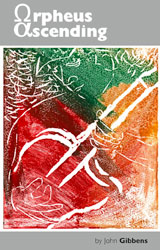Orpheus Ascending - OUT OF PRINT

Orpheus Ascending tells the story of the singer who falls dangerously in love, of the beautiful woman who becomes all things to him, and of the underworld king who claims her for his own. It tells how she is abducted and how the hero goes through hell to find her. Like Salman Rushdie, Nick Cave, Rilke Cocteau and Tennessee Williams before him, John Gibbens recasts the Orpheus myth in contemporary terms, this time in a strangely altered version of the London music scene in the late 1980s, a retro–future where violent unrest meets government backlash and where pastoral idyll becomes a precarious refuge from the perilous currents of history. It is a book about music, love and Fascism.
Sample Poems
1
When the evening singers had all but finished A wren appeared on one concrete fencepost And flew to the next, darted from platform To thicket and, after a moment lost To view, perched in a diamond of the mesh. Over the post the bird had graced a calm Round moon inched up from its branching niche. Surveying the sleeping river of rails While behind him in a faint electric hum The train that had brought him slept, its lights still on, Paul waited for the nine–thirteen to come, Steel’s complaining chirp forerunning its wheels. Parallel, tilted, recurring reflections Beguiled the short journey, and the petals Fallen from dwarfed ostentatious cherries, Bleaching and drifted on the suburban Ways he walked. Piling himself a plateful, He sat down in the feast–littered kitchen. A large–browed man was scorning the Tories; Another, his dope–wide gaze sceptical And glistering, mourned art’s difficulties. He glimpsed her for the first time by the door, Hesitating, looking in; quizzical, Timid, and dark–complexioned as the wren Out of the garden night. The light tussle Of bracelets accompanied her quick four Steps between the pairs of silenced men Reluctantly resuming as before. Paul studied her smooth profile as she leaned Over to help herself – then turned to bear His inspection frankly for an instant. Fumbling his fork, taken unaware, He scattered rice on his chair. As he gleaned And binned the grains, he thought a slight, distant Smile was on him – amused but not unkind.
6
London shows to the ebb of day that blackens the spire–crowned skyline her moment of tranquillity, her regal mood. Iniquity goes on yet, innocence is forced, the five–year–old child undresses for the video camera, and worse takes just a moment's thought. When Dame Town wears this evening gown, you leave it out of the picture. Clad in the eyes of your lover, black and pale–rayed aquamarine, she's mistress of forgetfulness, a hypnotist. Her head weighs down your shoulder, her spine's cool as night. Her Soho starts to palpitate to your spreading hand. You'd abuse her kindness by comparison. To her she's him, a darkling prince under a wasting, penal curse. The silent toiling river turns to oil at your feet, where you bend together at the parapet and lean apart to strike a match for her cigarette and your own, then fumble the latch of her lips to learn her mellifluous tongue. The Thames like a contraband tape of perpetual nothingness, glittering, streams and flickers on. Until we two secretly meet again, remember me this way, mouth open like a simpleton to catch whatever time you say. Or will it be '... madness!' 'Wednesday, six o'clock, then?' 'Look who's talking… ' Apart from headlights, streetlights, moon, neon, pub lights, stars and your eyes, everything's out. We're in the dark of fairy–tales and betrayals.
15
The stars that haven't fallen fade, mist creeps off the river. The distraught limbs assemble, they stand up from the pile and go back into the yards. I'm a winnowing, a husk blown from the sieve of occupations. The slaughterer changes aprons; the first calf, pale–headed, totters forward. Soon the runnels and gutters are healthy again with blood. Where is her gate of bronze and lapis? All the slaughterer's cash in my pockets is yours if you'll lead me to it.



